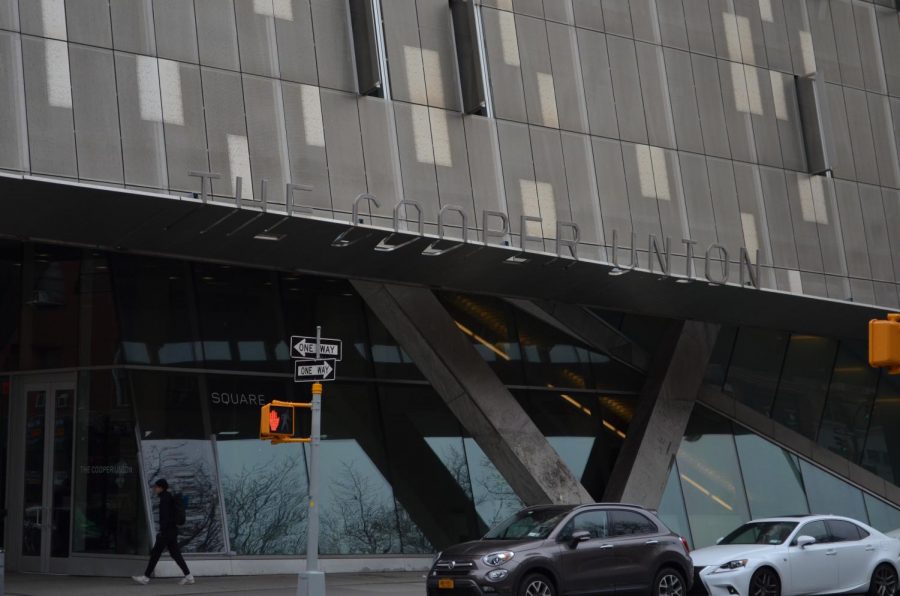After Years of Protest, Cooper Union Plans to Reinstate Free Tuition
A pedestrian walks past 41 Cooper Square, which houses many of The Cooper Union’s classrooms and studios.
March 21, 2018
Cooper Union, a private college which never charged tuition until the Fall of 2014, has recently released a 10-year plan to once again adopt free tuition.
After several demonstrations by upset students, years of planning and extensive feedback from the Cooper Union community by both students and alumni, the Cooper Board’s Free Education Committee published a plan to return to full tuition scholarships on Jan. 15, 2018.
Board of Trustees adopts plan to return to tuition-free education for all undergraduates: scholarships to increase in 2 years as part of 10-year plan. More at https://t.co/mSRYTjXZTh https://t.co/pqdQLyMVzi
— Cooper Union (@cooperunion) March 16, 2018
“Under the approved plan, The Cooper Union will begin increasing undergraduate scholarships in as little as two years as part of a 10-year timeline to generate the savings, expense reductions, fundraising, and other revenue increases necessary to sustainably provide full-tuition scholarships for every single Cooper Union undergraduate student,” Cooper Union Media Relations Manager Kim Newman said in a press release emailed to WSN. “The approved plan interlinks a return to free tuition with building long-term financial health and ongoing investment in Cooper’s academic programs and facilities. It seeks to generate $250 million over the 10-year timeline to bolster the institution’s financial resilience and invest in its world-renowned academic programs.”
According to Newman, this move will make the Cooper Union just one of 15 colleges in the United States that offers complete free tuition to undergraduates.
“I think they actually took a lot of input from the students, so that’s good,” Parker Limone, a senior at Copper Union, told WSN. “I know when they were writing the Free Education Committee report, the plan to go back to free, they had a bunch of info sessions students could go to.”
The report, which was recently approved by the Cooper Board and school president, details plans to increase scholarships within two years — provided that the college meets a critical amount of fundraising. They plan to return to full-tuition scholarships for all undergraduate students in 10 years. This would generate $250 million over the ten-year timeline both for the financial support necessary for free tuition and provide a crucial investment into the school’s academic programs.
How They Got Here
Since its inception in 1859 by philanthropist Peter Cooper, the school has offered select New York students access to higher education free of tuition. But after several reportedly financial missteps, Cooper Union fell into a financial crisis and began charging tuition to its undergraduate students to stabilize its financial accounts. Tuition at Cooper Union during the 2017-2018 school year is $43,250 according to the school’s website.
For the past four years, alumni and students have protested against Cooper Union for charging tuition. On May 8, 2013, two weeks after Copper Union announced it would charge tuition, students occupied the president’s office. Looking for other solutions to Cooper Union’s financial crisis and to broadcast their protest and rebellion, some students occupied the president’s office, spending hours or even days there. The school initially responded to the student occupation forcefully. Bathrooms were locked and armed guards were stationed around the building.
Eventually, students and supporters passed the guards and entered the office, standing their ground and locking arms in solidarity. Cooper Union has since changed its response to the protest, allowing occupiers to leave and enter at will. The last students left the building on July 17, 65 days after the occupation began.
“I guess it’s good to get that sort of message from the administration, because they’ve been kind of vague in the past and it’s better to get a clearer signal,” Cooper Union senior Juliet Dipietro said. “It’s a little sad that the timeline is so long, since it certainly doesn’t affect any of the students currently enrolled, but I think it’s progress.”
Email Louise Choi at [email protected]























































































































































